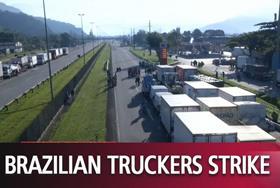
A nationwide truckers’ strike in Brazil over rising diesel prices is causing severe shortages of food and fuel, and disrupting exports of fruit and other agricultural products.
The stoppage has now entered its second week after truckers rejected an offer by President Michel Temer to cut the price of diesel by around 12 per cent, and with other workers are threatening to join the movement, the country is facing a worsening crisis.
Brazil is almost entirely dependent on road transport and the strike has already caused significant losses to the country’s agricultural sector, including the forced culling of 70m chickens due to lack of feed.
Prices of fruits and vegetables have skyrocketed as consumers face empty supermarket shelves across the country, while produce bound for export markets is caught up in road blockages or accumulating at ports, where terminals are close to full capacity.
Last week, the national fruit producers and exporters association Abrafrutas said: “our members continue to experience delays of three days on average, especially in the port of Santos and the Guarulhos airport, where the processing of documents and phytosanitary protocols seems to be particularly slow”.
The truckers’ strike is putting growing pressure on Temer, who came to power following the impeachment of his predecessor Dilma Rousseff in 2016.
HLB Specialties, the largest Brazilian papaya importer into North America, said road blockages were restricting access to many airports causing delays in airflown shipments of Golden papayas into the company’s US and European facilities.
“It is uncertain when the strikes will be lifted. Our last shipment was on Monday (21 May) and the situation is getting worse,” said Melissa Hartmann de Barros, the company’s director of communications.
“Now gas stations are running out of fuel and soon transportation might get paralysed.”



